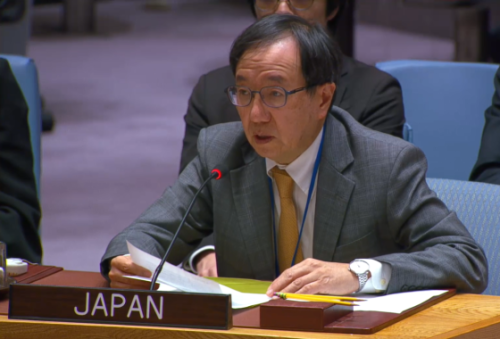小型武器に関する安保理公開討論における山﨑大使ステートメント
令和7年11月10日

(as delivered)
Mr. President,
First of all, I express our appreciation to Sierra Leone for convening this open debate and to the briefers for their valuable insights.
The illicit trade and diversion of Small Arms and Light Weapons (SALW) fuels conflicts, exacerbates instability, and impedes recovery and development efforts. This complex global challenge requires a multi-faceted approach by the international community including the Security Council.
Significant progress has been made through existing multilateral frameworks, notably the UN Programme of Action (PoA) on SALW. The PoA’s Fourth Review Conference last year adopted action-oriented measures and plans to prevent, combat and eradicate the illicit trade in SALW in all its aspects. The PoA’s biennial meeting next year will be a key opportunity to follow up on those commitments and address new technological trends.
The Arms Trade Treaty plays a major role in regulating the international trade in conventional arms and preventing their diversion to unauthorized recipients. Continued and expanded implementation by Member States will further strengthen these instruments.
Moreover, at the UN General Assembly, Japan, together with Colombia and South Africa, has been sponsoring the SALW resolution every year. At the First Committee this year, this resolution was adopted by consensus with 78 co-sponsors.
Mr. President,
It is essential to provide necessary support to enable Member States to take effective action on the illicit trade and diversion of SALW in the mid-term and long-term while respecting national ownership.
Given the intertwined nature of security and development, Japan emphasizes the importance of a holistic approach that encourages international cooperation and maximizes efficiency with limited resources when working on SALW issues. One example of this concept is the Saving Lives Entity fund, to which Japan has contributed 2 million USD.
Recipient countries of this fund also shared useful feedback. They highlighted the importance of strengthening stockpile management and the effectiveness of regional approaches, to name a few. These lessons are demonstrated in the Secretary-General’s report as well, and should be reflected in our actions going forward.
Mr. President,
As indicated by resolution 2616, the Security Council has an indispensable role to play in addressing the root causes of conflicts, including the issue of SALW, through its mandates in peacekeeping, special political missions, counterterrorism, arms embargos and sanctions regimes.
In this regard, Japan reiterates that illicit arms transfers in violation of relevant Security Council resolutions are absolutely unacceptable and strongly opposes activities that undermine the sovereignty and territorial integrity of Member States. The Council and all Member States must redouble their efforts to effectively implement and ensure compliance with mandated measures.
I thank you.
